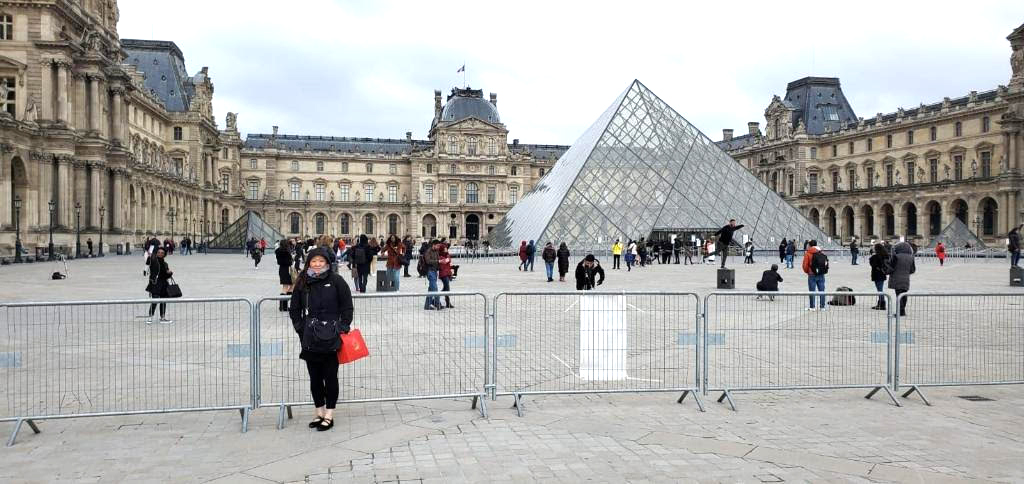By Vivian Nguyen
Northwest Asian Weekly

Amy Choi in front of the Louvre when they announced its closure. (Photo provided by Amy Choi)
After pulling two all-nighters for work, Amy Choi was in a rush to board her United Airlines flight from Seattle to Paris on Feb. 27.
Choi, who’s a Global Internet of Things Program Manager at Amazon, planned to attend the Embedded World Conference in Nuremberg, Germany for a work trip. To take advantage of the transatlantic flight, many Amazon employees had added a personal trip to their work trip, and Choi chose Paris for hers.
A few days before her departure, Choi’s work trip was cancelled over COVID-19 concerns, but Choi decided to still move forward with her Paris trip.
At the time, she wasn’t too phased about the coronavirus since she saw it as largely contained in China. But she knew the drill: stay home if you’re sick, wash your hands, and use hand sanitizer. She brought four travel-sized bottles with her. And with CLEAR expedited airport security program, Choi breezed through TSA checkpoints.
There was no additional screening required for passengers. And nothing felt amiss at Seattle-Tacoma International Airport.
Flight out to Europe
It wasn’t until her layover at Dulles International Airport in Washington, D.C. that Choi realized how wary people had become. As Choi boarded her connecting flight from D.C. to Paris, she felt eyes follow her as she walked towards her seat at the plane’s rear.
“It honestly felt like people were hoping I wouldn’t sit next to them because I’m Asian,” said Choi.
Her seat was next to a French couple. To allay their fears, Choi made a show about speaking clear English, and even sanitized her shared armrest as well as her tray table. The couple visibly relaxed soon after. Still, there was an overall anxious mood on the flight.
“If anyone coughed or sneezed, there was a collective knee-jerk reaction,” said Choi.
She recalled a moment where, after someone sneezed several times, another passenger rummaged through their bags in the overhead compartment to fish out a mask, which was worn for the remainder of the flight.
When Choi landed at Paris-Charles de Gaulle International Airport, however, her anxieties were quickly replaced with new ones as she navigated the airport and city for the first time.
While Paris remained largely accessible at the time, it didn’t feel like the best time to be an American abroad.
“I didn’t know what the lesser evil was—to be an American under Trump’s presidency, or to be Asian and be mistaken for being Chinese,” said Choi, who’s Korean American. “I didn’t experience racism in Paris, but I also made an effort to be as American as possible.”
Choi recalled how locals laughed at news clips of Americans hoarding supplies amid coronavirus fears. In present day, though, Paris is under a strict lockdown with exceptions made for purchasing groceries, getting medication, or commuting to work for essential roles. People leaving their homes must have a signed form justifying their movements, or face fines.
“When the virus doesn’t affect someone, they’re not concerned,” said Choi. “But the moment it affects them, their mocking attitude changes because that’s the way fear spreads—it’s not just the virus.”
The French government closed major attractions like the Louvre Museum and the Palace of Versailles during Choi’s stay, and with the number of infected cases rising around the world, she considered returning home early. She even looked up flights and consulted with family and friends about it, but eventually decided to see out the remainder of her trip.
Flight home to Seattle
In hindsight, Choi’s instinct was spot on.
Choi flew home on a United Airlines flight on March 8 and just missed President Trump’s announcement to ban all incoming flights from Europe on March 11. Although it was later clarified that U.S. citizens could return home from Europe, Choi’s thankful she left when she did to avoid being stuck in-transit.
On her return flight, which consisted of two legs, Choi sat in a first class pod from Paris to Chicago O’Hare International Airport, and then the first class section on her final leg to Seattle.
With seats in first class, her interaction with other passengers was minimal. Still, she sensed a heightened fear about the coronavirus—even in first class, which has more space between pods and seats compared to the main cabin.
Choi heard that airlines would be increasing deep cleanings across flights. But that wasn’t the case on either return leg with visible debris on the seats and cabin floors.
“I still had to use my sanitary wipes and clean everything in my area,” said Choi. “The airline wasn’t taking the precautions they promised to do.”
When Choi landed in Seattle, there were still no extra questions asked of her during customs, nor was additional screening required. Out of the four major airports Choi passed through, Charles-de-Gaulle was the only one that required additional questioning to people arriving with a Chinese passport.
“There was still nothing in place to prevent any kind of spread,” said Choi of Sea-Tac Airport. “It was concerning to return home and see that, especially knowing how everything else was escalating around the world.”
Choi’s grateful to be home, but emphasized that much still needs to happen to prevent community spread at a national and local level.
“The virus has spread to all 50 states and that’s 100% on [Trump’s] administration,” said Choi. “There’s been so much economic instability and lack of consistency to enforce regulation.”
Vivian can be reached at info@nwasianweekly.com.



